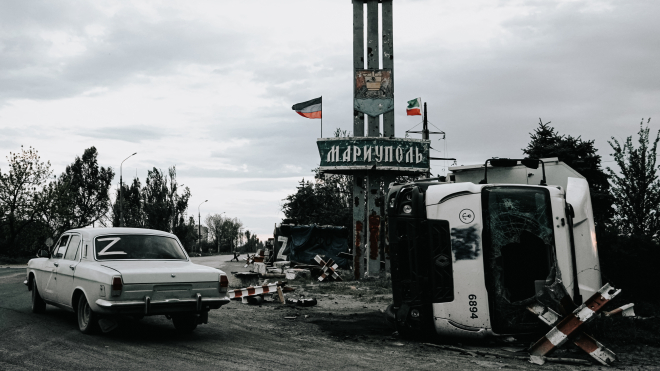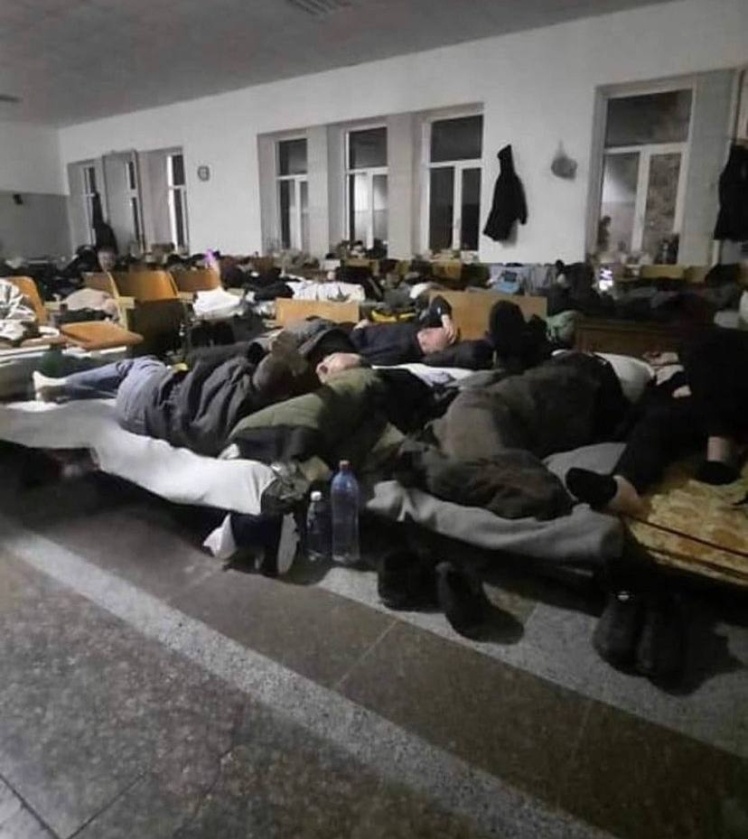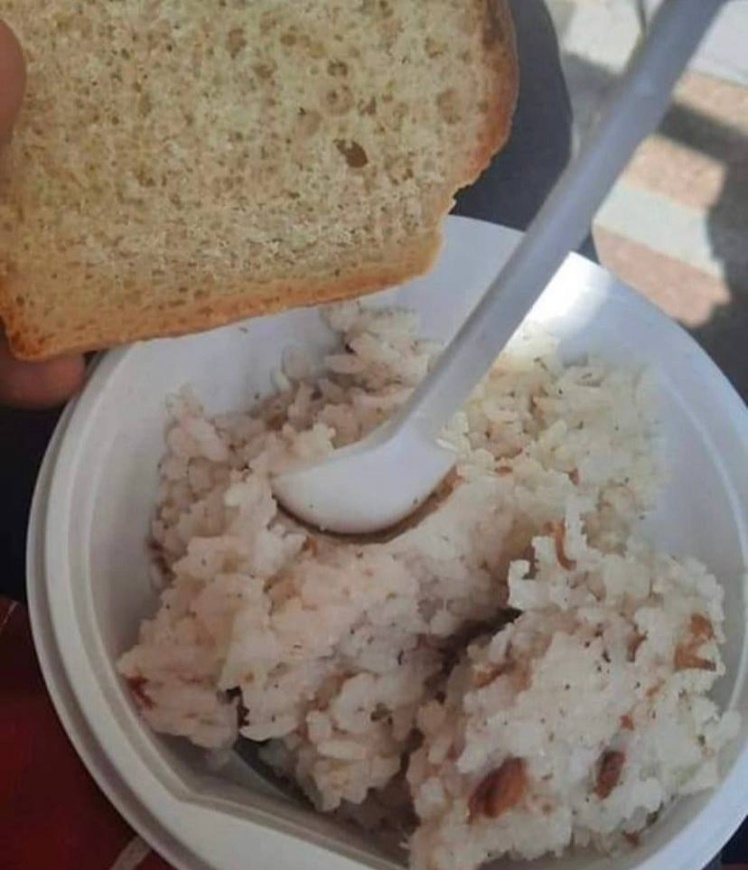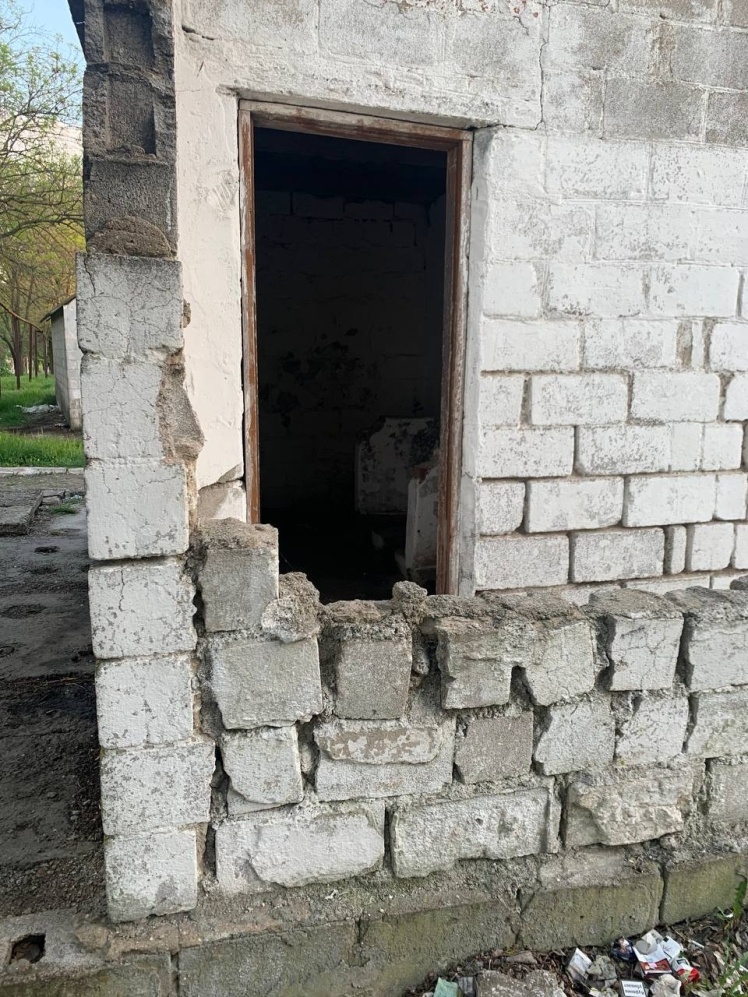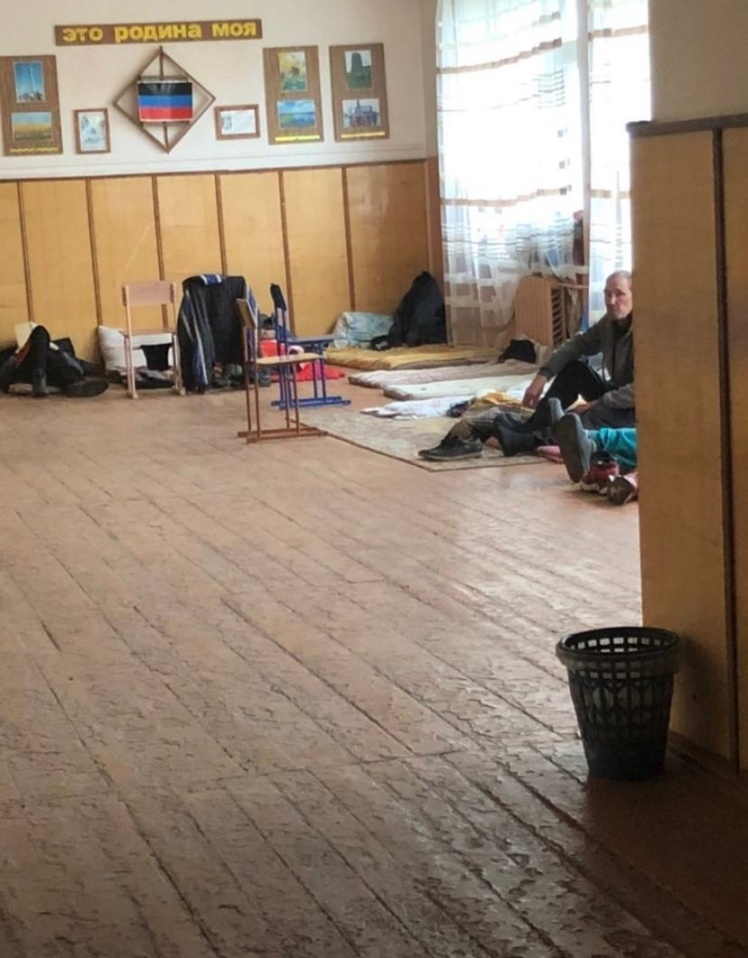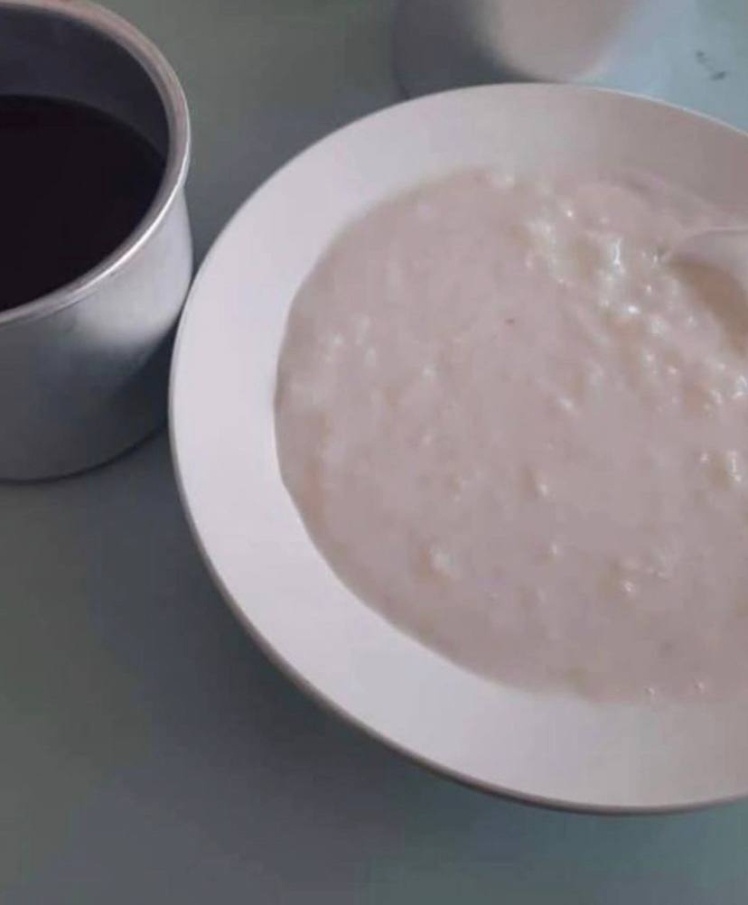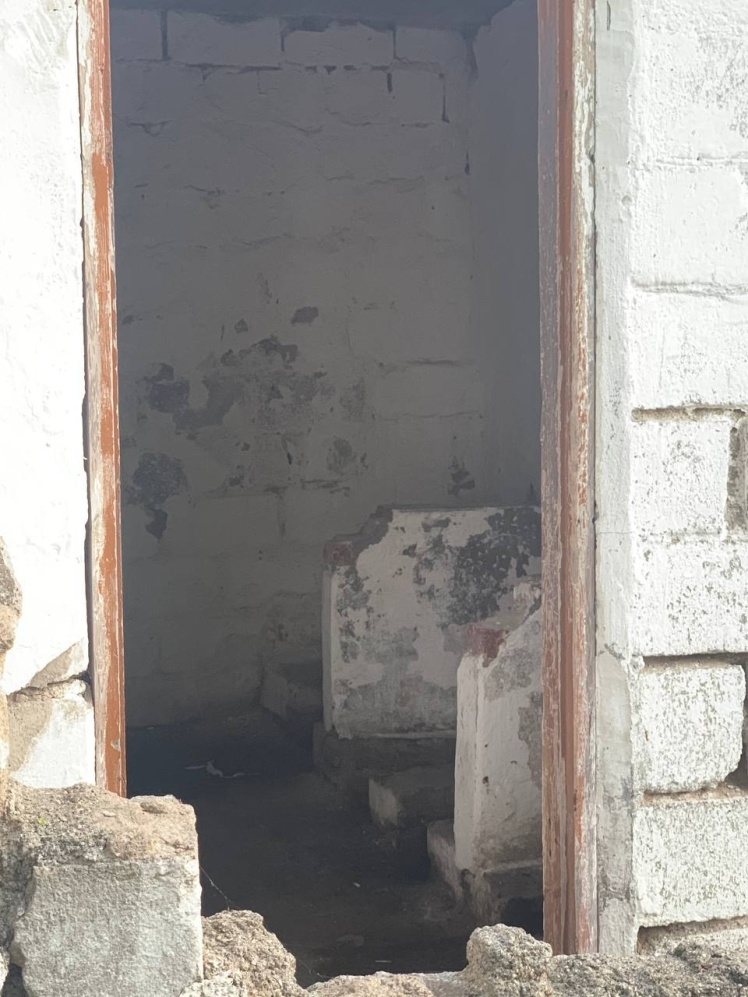Katya and Max
Furniture designer Katya lived with her parents in the center of Mariupol, near the drama theater. Her boyfriend Max lived on the outskirts of the city, in Myrnyi settlement. Communication between them was cut off on March 2.
On the morning of February 24, Katya woke up to the sounds familiar since 2014 — explosions. To quell the panic, she began to gather for work, and her parents insisted on waiting for when the danger subsides. They were sure that only the outskirts were being shelled. Katya stayed at home, her colleagues installed childrenʼs furniture for the clients for two more days.
On March 2, the mobile and internet connection disappeared in the city. Two days later, a rocket hit a gas station about a hundred meters from Katyaʼs house, another hit a neighborʼs house, killing her husband and son. At first, Katya and her parents hid in rooms without windows and closets, then in the basement of the summer kitchen. The main house was damaged by an explosion.
— The house of neighbors was hit at exactly 11 p.m., — she remembers. — Night, silence, whistle, roar — and then grave silence. And a whole human life collapsed. It was the worst.
The next day, Katya learned that a humanitarian corridor from the city would be opened. The family packed their suitcases in a car and went to the drama theater. Along with hundreds of others, they waited for several hours under fire, but the evacuation was eventually canceled — too dangerous.
Getty Images / «Babel'»
In desperation, they sought a safe haven in the city, but there were no more safe places. Gas was running out, so Katya with relatives decided to go home. On their way they stopped near the medical center and asked about shelter — it turned out that workers were allowed into the basement, but the family was also accepted. Katyaʼs elderly parents fainted and had problems with pressure, so it was easier for them to survive the shelling at the hospital. The worst thing for her was to hear her motherʼs instructions, where to look for the documents and money — in case sheʼll have to run away on her own.
However, the family spent only a night in the medical center — the next morning the Ukrainian military came there and declared it a military hospital. Then Katyaʼs mother mentioned a friend who lived in a quiet private area in the lowlands. On March 6, the family left their home and went there. There were eight of them in the new shelter.
There was no more centralized water or gas supply in Mariupol. The family was rescued by a wood stove and a nearby river. Every day on the way to the water they saw new shells and the dead. The house trembled — the area, although relatively intact, was located between the plants of Ilyich steelworks and Azovstal.
Katyaʼs parents checked their house every day, guarding it against looters. On March 10, after a direct hit of a missile, the house burned down. The car, although bent and without glass, was still operational. Katya saw watʼs left from the house two weeks later.
On March 19, she learned that a mobile connection could be caught on the roofs of some high-rise buildings.
— We lived in obscurity, thought that everyone forgot about Mariupol, — Katya recalls. — It just ate us from the inside. When I heard my friendʼs voice, I cried. She said we had to leave and explained how it could be done.
The next morning Katya and her parents left the city.
— God, what we saw is not to be expressed in words, because no one will understand it… It feels completely differently than in the photos. You see the streets you walked, but there is nothing left from them. You see familiar houses — but they in fact donʼt exist anymore. Incredibly many corpses. And itʼs only on one street!.. Then I saw with my own eyes that our house is also gone.
Getty Images / «Babel'»
They arrived in Berdyansk in the evening, where they were sheltered by simple passers-by: they gave the keys to the apartment of the neighbors who left. The thing that Katya remembered from that evening the most was the taste of a sandwich with sausage and homemade milk. The next morning they managed to find gasoline for 100 hryvnias per liter and drive to Zaporizhzhia.
— I was so happy to hear the Ukrainian language at the checkpoint… Only then I exhaled [with relaxation]. It was such a relief.
Relatives proposed the family move to Russia, but Katya said it was unacceptable — it would mean forgiving everything that had been done to her life and her country. Six days later, the family drove to Rivne in a wrecked car, and was later joined by another daughter, who left Mariupol on foot with her family.
When the mobile connection appeared, Katya learned from Maxʼs aunt that he couldnʼt leave Mariupol. He tried to do it the day before she left, but the neighborsʼ cars got under fire and they decided to wait. A few weeks later, in mid-April, Russians came to his house in Myrnyi settlement and took him and other men to the village of Kozatske for alleged filtration. Some were promised to be kept there for only 15 minutes, some were told for a few hours, and others were told that the filtration would take two days. However, all the men have been held hostage for four weeks now.
The school in Kozatske village now allocates 188 people, says Max. All of them were filtered on the first day and received a "document" entitling them to move through the occupied territories. However, these papers, together with passports, were taken away from them.
— Maksym wrote to me on Instagram on April 13, when he charged his phone and found Wi-Fi at school, — says Katya. — The phone is the only thing he has, but many donʼt have even that. We are in touch every day.
It is alleged that the detained are not forbidden to communicate with their relatives, but the guards have already threatened to take away their phones. Katya says: because the abducted women "raised a riot".
But so far Max still writes her, occasionally calling and sending photos. In these photos exhausted men sleeping on the floor and chairs of the gym and school classrooms with the flags of the unrecognized "DPR". There are breakfasts and dinners: sticky pasta, rice, tea without sugar. People can wash only under the old Soviet sink. The "guards" of the camp are constantly drunk, regularly demand the detained to show their shoulders — checking for traces of weapons. Max says heʼs fine, but he has seen the men beaten. Almost everyone in the camp is sick. Some have symptoms of respiratory diseases, there are cases of pneumonia and COVID-19. On the third day of his stay in the filtration camp, a man died of suffocation. "DPR policemen" guarding the camp refused to provide medical assistance to him. The corpse was wrapped in a sheet and taken out.
«Babel'»
While trying to escape from the camp, two men were brutally beaten, and later they disappeared. The guards said they were sent to the "isolator" in Donetsk. So the rest try to wait patiently.
Katya applied to the "official" helplines of the "DPR", but there she was assured that according to the documents, these men had already been released home. The girl is afraid that they will simply disappear — local “authorities” can do anything with the prisoners. She relies on an acquaintance who has ties with the “DNR”: he said that the men are being held for the parade on May 9. However, not all the prisoners were taken there, and even later the men were not released.
— They are in despair, although they are trying to hold on, — says Katya. — I try to support Max, but… I experienced the same thing: during the day you still convince yourself that we will survive and everything will be fine, and then the evening comes and you realize that no, nothing will get better. Other women who have men there also find it hard to keep optimistic. We donʼt understand why this happened to ordinary peaceful people. Iʼm very scared for Max. But we try to talk about our future. I believe that he will be able to transit through Russia to another country. And I will join him — Iʼll wait for him in any corner of the Earth.
Nina and Kyrylo
Nina is waiting for her husband Kyrylo in an occupied village near Donetsk.
In Mariupol, she worked for a local TV channel, her husband resigned from the police in February and planned to work in the field of economic security from March. Ninaʼs parents left the exhausting work at the factory a few years ago and began to live for themselves, choosing professions to their liking: her father became a builder, mother an assistant cook.
They have lived in Mariupol for 15 years, leaving the town in Luhansk Oblast. Nina loved to come to the sea and see how something new is created in the city — as a journalist she saw all the development processes from the inside. Thatʼs why what Mariupol has become with the arrival of the Russian army brings even more pain to her.
Getty Images / «Babel'»
During the first few days of the war, Nina was still working, interviewing people on the street, but when the mobile and internet connection in the city disappeared, work became impossible. She, her husband, and his brother spent several days in the apartment, but the stocks of water and food quickly ran out. So they decided to go to her parents, who lived in a private house in the Myrnyi settlement in the outskirts of Mariupol. The road under fire between the looted shops and broken houses took 4 hours. They took only backpacks with clothes and documents.
In Myrnyi it was easier. Parents had a supply of food, meat could be stored on the outside as it was still cold, they drank technical water from a hydrant near the school. But very soon it became too dangerous there as well: the Russians fired on hearby Ilyich steel mill and the village itself. Mortars, Grads, air bombs fell around them. On March 30, after the destruction of several neighboring houses, the family — Nina and her parents, Kyrylo and his brother — moved to a reliable shelter at the Ilyich. There were already two hundred people there, including children and the elderly who couldnʼt walk.
— The shelter was shaking. They were fighting all over the plant, the guys put out the fires [near us] twice, — says Nina. — But the storage was prepared in advance, we had electricity, a generator, water. It was difficult to find a place, because we arrived late: some have been hiding there since February 24.
They spent 10 days in that shelter. At first it was still possible to rise to the surface, to smoke handmade cigarettes with tea, but later the shelling intensified. The food was over — only cheap pasta and instant noodles were left. People shared what they could.
— But we werenʼt friendly at all, — says Nina. — On the contrary. We looked at each other to see if anyone was wasting food or exchanging it for cigarettes. Everyone was hungry. Both fuel and food ran out, so we decided to leave: it doesnʼt really matter what to die from: fire or starvation.
At first, the Ukrainian military didnʼt release people because of the danger — the nearby area was already occupied by the Russian army. However, the servicemen were persuaded, and on the third attempt locals, accompanied by them, managed to break through the blockages to the village. The ruin they saw seemed horrible — until later Nina saw the ruined city.
Getty Images / «Babel'»
The family lived with friends for a few days, and then the "cleansing" of the village began.
— Kyrylo is a former law enforcement officer, and we were very afraid for him, — says Nina. — We didnʼt know where to hide him. But still decided to return home: in any case, the Russians went from house to house and did a census.
Ninaʼs house was knocked on in the afternoon of April 14. Kyrylo and Andriy, Ninaʼs father, were ordered to get their stuff packed. They didnʼt take the phones with them: there was no connection or ability to charge them. The Russians promised to return the men in a few days, but first they were taken to Sartana, and from there to the camps. Kyrylo and Andriy still havenʼt returned.
Nina knows more about her fatherʼs fate. He is at the school in the filtration camp in Bezimenne. The Russians are holding about 600 men who have already been filtered. One of them has a phone, he wrote in a group in Viber messenger, where he is. Nina wrote to the man asking him to find her father, and gave him her phone number. Now Andriy asks someone for a phone from time to time and communicates with his daughter. He calls his wife separately: she stayed in the village waiting for her husband to return. She sometimes gathers with other women in the settlement center and everyone in turn talks to relatives on the same phone.
Prisoners of the filtration camp in Bezimenne can be visited. So Andriy was able to get the package with personal belongings. He tells his daughter that they are fed five times a day and that he is not hungry — but Nina knows that he in general rarely complains about something. He can leave school, but it doesnʼt make sense — itʼs forbidden to move around without documents. To get out of the camp, one man broke his arm, several others were sent home with pneumonia. However, men with open form of tuberculosis and COVID-19 remain in the camp.
— My father said he couldnʼt sleep for four nights because of a bad dry cough, — says Nina. — He coughed terribly while talking to me. Recently, a "pharmacy" came to them and he bought antibiotics — he says the cough is getting weaker. The doctor examined him and said that his lungs were clean, so he was not released from the camp.
It is unknown why the men are being held there. The "DPR military" with whom Nina managed to talk say that they are waiting for "a special order" or for the fall of Azovstalʼs defense.
Nina herself left Mariupol in late April. Before leaving, she visited her apartment: luckily, it wasnʼt shelled. But it was robbed. Neighbors said that the door was broken only to her flat: they were searching for Kyrylo.
— I didnʼt know that it is possible to leave Mariupol for the territory controlled by Ukraine, — Nina says. — My husbandʼs brother and I saw the buses of the “DPRʼs” “Ministry of Emergencies”. People there promised to take us to Donetsk, where we will be able to pass the filtration without waiting in line.
But it happened differently: they were taken to the occupied Starobesheve settlement and told to get to Donetsk alone. They waited for 5 hours for filtering, sat in line for another 4 hours and were interrogated by "policemen" in rubber slippers. In the questionnaire, Nina honestly wrote about her husbandʼs profession — there were no questions regarding that, and so she realized that Kyrylo had already passed the filtration. Instead, they interrogated her because of her work — what she filmed, whether she made stories about Azov Regiment, or whether she plans to work for the “DPR”. There were questions about the attitude to Ukraineʼs leaders, the interrogators asked to assess the work of law enforcement and local governments.
— This interrogation wasnʼt strict, — says Nina. — They could have asked me a lot of things, but they didnʼt care. And thatʼs good, because I couldnʼt take it anymore. And what did I have to say and write?... To save my nerves and life, I wrote what they wanted.
The family took a taxi to Donetsk for 2,000 Russian rubles, and from there to distant relatives in a village. They took a shower, ate — and didnʼt believe that this happens. A few days later, a stranger called her at night and said that Kyrylo was alive — the man had already left the filtration camp, having spent a month there. The occupants say people are released after this term.
Nina learned that Kyrylo may be in a colony in occupied Olenivka town: former law enforcement officers, prosecutors, military and volunteers were brought there. Another option was a pre-trial detention center in Donetsk.
She didnʼt find her husband in the colony. Nina has no official information about his fate, although she visited Donetsk twice in search. She also asked acquaintances of local "law enforcement officers" who were reluctant but still agreed to help.
— They said just to wait, — Nina says. — I am very worried about him and afraid to make things worse. Iʼm afraid to write about this, Iʼm afraid they may intercept my phone conversations. Although information about the camps is allegedly open. I berate myself a lot for being unable to go to Donetsk often.
However, she knows from the women Nina met under the walls of the colony in Olenivka that personal trips and appeals also donʼt produce results. As well as an overnight stay under the walls of the colony and calls to hotlines.
In the village, where Nina is now waiting for information about the fate of Kyrylo, there are almost no men. They were taken to the war two months ago. She hardly goes outside, as well as talks to anyone. Locals, hearing sheʼs from Mariupol, just nod silently. Nina would like to think that this is an expression of compassion — but no one admits it. Itʼs hopelessness that fells in their reactions.
Getty Images / «Babel'»
To distract herself, Nina cooks, bakes pies, cleans and plays with a cat she took from Mariupol. She canʼt get enough of the news she hasnʼt had for so long — during her stay in Mariupol she only heard the national marathon on the radio twice and listened to the “DPR” radio, laughing at reports of the opening of a cowshed and plans to repair roads.
— During the day I hold on, but in the evening it gets really bad, — says Nina, and for the first time in two hours of conversation begins to cry. — I look at photos on my phone every night and I understand bit by bit that it wonʼt be like this anymore. And Iʼm waiting for whatʼs next.
She is preparing for the return of Kyrylo and her father and is drawing up possible routes. She doesnʼt want to think about what they can do to them. Convinces herself that the worst has avoided them.
— But everything continues. Mom is there — collecting rainwater. Iʼm here — deceiving myself, trying to understand something. It would be good if there was any coordinated search for relatives as this would help to survive the trauma. But there is no such thing. We wonʼt stay here for sure, but I canʼt imagine what to do. I canʼt decide anything until I see my husband.
Nina has summer clothes with her for Kyrylo. And their photo from the first New Year together five years ago.
Where relatives of such men can find help?
Adviser to the Mayor of Mariupol Petro Andryushchenko states that men from the villages of Guglino, Myrnyi and Volonterivka are being held in the camps. They are beaten and used for forced labor, threatened with execution for escape, fed with empty soup and planned to be used to dismantle the Mariupol debris or mobilized to the occupiersʼ army.
Getty Images / «Babel'»
— The last unsuccessful attempt [to escape], ironically, was to break into the evacuation buses of the UN and the Red Cross, which the detainees saw from the windows, — Andryushchenko wrote.
Neither Nina nor Katya have appealed to local authorities, Ukrainian law enforcement or human rights activists — they donʼt believe that they will be able to change what is happening in the occupied territories.
Regarding the abduction and deportation of civilians, a person in Ukraine can contact the hotline of the Commissioner for Human Rights: 0800-50-17-20
Human rights activists organization Vostok SOS are also working on the problem, here are its phone numbers. The organization helps to find a lawyer in Ukraine who works with the case at the Ukrainian and international levels. However, Vostok SOS admits that this doesnʼt really affect the conditions of detention or release of deportees. It just documents the crime done by Russia.
Translated from Ukrainian by Anton Semyzhenko.
Support Babel:🔸donate in hryvnia 🔸in cryptocurrency 🔸via PayPal: [email protected].
